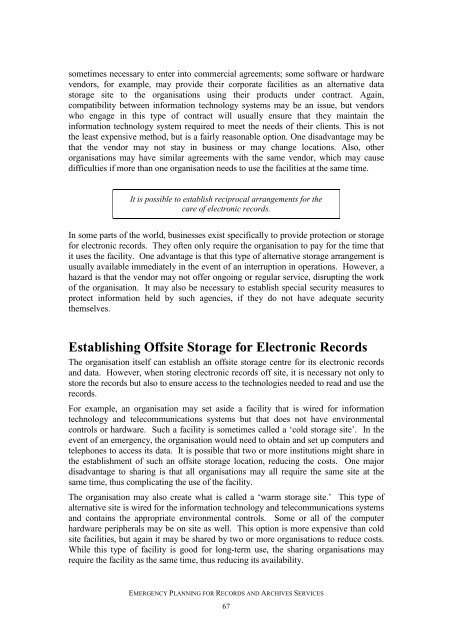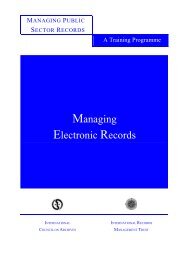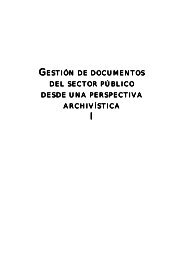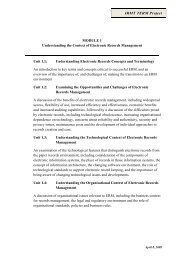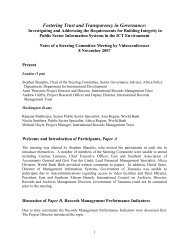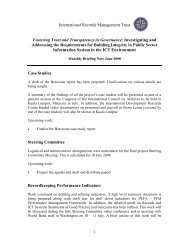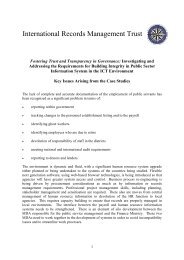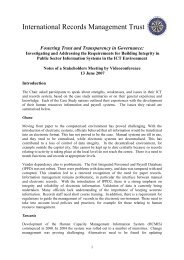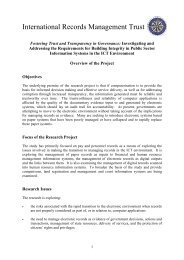disaster planning and control - International Records Management ...
disaster planning and control - International Records Management ...
disaster planning and control - International Records Management ...
You also want an ePaper? Increase the reach of your titles
YUMPU automatically turns print PDFs into web optimized ePapers that Google loves.
sometimes necessary to enter into commercial agreements; some software or hardware<br />
vendors, for example, may provide their corporate facilities as an alternative data<br />
storage site to the organisations using their products under contract. Again,<br />
compatibility between information technology systems may be an issue, but vendors<br />
who engage in this type of contract will usually ensure that they maintain the<br />
information technology system required to meet the needs of their clients. This is not<br />
the least expensive method, but is a fairly reasonable option. One disadvantage may be<br />
that the vendor may not stay in business or may change locations. Also, other<br />
organisations may have similar agreements with the same vendor, which may cause<br />
difficulties if more than one organisation needs to use the facilities at the same time.<br />
It is possible to establish reciprocal arrangements for the<br />
care of electronic records.<br />
In some parts of the world, businesses exist specifically to provide protection or storage<br />
for electronic records. They often only require the organisation to pay for the time that<br />
it uses the facility. One advantage is that this type of alternative storage arrangement is<br />
usually available immediately in the event of an interruption in operations. However, a<br />
hazard is that the vendor may not offer ongoing or regular service, disrupting the work<br />
of the organisation. It may also be necessary to establish special security measures to<br />
protect information held by such agencies, if they do not have adequate security<br />
themselves.<br />
Establishing Offsite Storage for Electronic <strong>Records</strong><br />
The organisation itself can establish an offsite storage centre for its electronic records<br />
<strong>and</strong> data. However, when storing electronic records off site, it is necessary not only to<br />
store the records but also to ensure access to the technologies needed to read <strong>and</strong> use the<br />
records.<br />
For example, an organisation may set aside a facility that is wired for information<br />
technology <strong>and</strong> telecommunications systems but that does not have environmental<br />
<strong>control</strong>s or hardware. Such a facility is sometimes called a ‘cold storage site’. In the<br />
event of an emergency, the organisation would need to obtain <strong>and</strong> set up computers <strong>and</strong><br />
telephones to access its data. It is possible that two or more institutions might share in<br />
the establishment of such an offsite storage location, reducing the costs. One major<br />
disadvantage to sharing is that all organisations may all require the same site at the<br />
same time, thus complicating the use of the facility.<br />
The organisation may also create what is called a ‘warm storage site.’ This type of<br />
alternative site is wired for the information technology <strong>and</strong> telecommunications systems<br />
<strong>and</strong> contains the appropriate environmental <strong>control</strong>s. Some or all of the computer<br />
hardware peripherals may be on site as well. This option is more expensive than cold<br />
site facilities, but again it may be shared by two or more organisations to reduce costs.<br />
While this type of facility is good for long-term use, the sharing organisations may<br />
require the facility as the same time, thus reducing its availability.<br />
EMERGENCY PLANNING FOR RECORDS AND ARCHIVES SERVICES<br />
67


